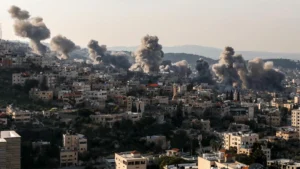Israel’s West Bank assault displaces 26,000 from Jenin and Tulkarm camps

Smoke rises over buildings in Jenin refugee camp during an Israeli forces assault, 2 February 2025
Lubna Masarwa and Heba Nasser report in Middle East Eye on 5 February 2025:
The Israeli military has displaced 26,000 Palestinians from their homes in Jenin and Tulkarm since launching its major assault on the occupied West Bank last month. Farha Abu al-Haija, a member of the Popular Committee in Jenin Camp, said 17,000 people have been forcibly expelled from the Jenin camp, home to over 24,000 registered Palestinian refugees.
For the past two weeks, the Israeli army has besieged, invaded and bombed the camp and its surroundings.
The UN agency for Palestinian refugees, Unrwa, has said that large parts of the camp have been completely levelled in a series of detonations, estimating that at least 100 houses have been destroyed or heavily damaged. On Sunday, Israeli forces simultaneously blew up nearly 20 buildings on the eastern side of the camp after rigging them with explosives, the Palestinian state news agency reported.
Israeli forces have prevented movement inside and residents have been forced to flee under shelling and explosions.
Abu al-Haija said the Israeli army has also expelled families living in the vicinity of the camp, where they also blew up a building composed of 20 flats, leaving 200 residents homeless. The Palestinian health ministry said Israeli forces have killed at least 70 people in the West Bank since the start of the year.
Abu al-Haija told Middle East Eye that displaced residents have fled the violence to different places in Jenin and its countryside, which have also been affected by the military campaign. Palestinian families are now hosting up to 20 displaced people in their homes amid a lack of basic amenities such as electricity and water. “Both the displaced families and the families who are receiving them are financially strapped. Prior to the Israeli military campaign, the camp was besieged by the Palestinian security services for 48 days. People have been without work for three months and have been unable to secure their basic daily needs, including food,” Abu al-Haija said.
Weeks before the Israeli operation, the Palestinian Authority launched a large-scale security campaign in Jenin that involved besieging the city, shooting at unarmed civilians and clashing with local fighters. Abu al-Haija, who also works with an organisation that provides psychological support to women and children, said that due to the Israeli siege, no one knows the full extent of what is happening inside the camp or the damage being caused.
Jenin’s residents, who have endured repeated military raids for the past two years, said the violence and intensity of the current assault exceeded even the notorious invasion of the camp during the Second Intifada in 2002.
“The families in Jenin are in shock by the magnitude of the raid. It is similar to what happened in Gaza, only this time it’s an area of just one square kilometre,” said Abu al-Haija.
Living in constant fear
The ongoing incursion has been particularly devastating for children, who have been unable to attend school since early December. Unrwa spokeswoman Juliette Touma stated that 13 Unrwa schools in the camp and surrounding areas have been closed, affecting around 5,000 children.
